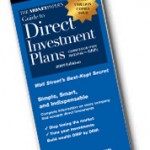How to buy shares directly from companies and avoid commission fees
 Giveaway Alert: We have two copies to give away of The Moneypaper’s Guide to Direct Investment Plans (a $27 value). Comment at the end of this post for your chance to win a copy.
Giveaway Alert: We have two copies to give away of The Moneypaper’s Guide to Direct Investment Plans (a $27 value). Comment at the end of this post for your chance to win a copy.
Anyone remember my epiphany earlier this year about how I learned the difference between Exchange-Traded Funds (ETFs) and Mutual Funds? Here’s another tip for those of us wanting to put our toe in the investing waters: Buy shares directly from companies.
Sound complicated? Not really. It can be done through a dividend reinvestment plan (DRIP), otherwise known as a direct investment plan. These are offered by companies to allow individuals to buy stock without a broker. DRIPs originated to help company employees ‘“ and over time expanded to help people who already owned some shares in the company.
Kiplinger.com explains:
In uneasy times, a DRIP offers you a way to nibble at lower-risk shares that’s affordable, fee-friendly and enforces the kind of investing habits we at Kiplinger’s like to encourage. DRIPs are great for risk-averse investors because they focus on dividend-paying stocks, which provide cash cushions even if share prices continue to tumble. Dividends won’t protect you from stock-market carnage (just ask anyone with a stake in financial stocks), but you’ll be paid while you wait for better days.
Reinvesting those dividend payouts in additional shares forces you to dollar cost average, which means simply that you invest money at regular intervals. The beauty of this strategy is that it takes the emotion out of investing and, by definition, guarantees you’ll buy more shares at lower prices and fewer when prices are high.
The best DRIPs cut investing fees to the bone. Some let you buy shares directly from the company with no broker fees, then charge you little or nothing to reinvest your dividends or buy additional shares-sometimes even at a discount to the market price. And DRIPs don’t require a huge commitment to the market — often just a couple of hundred dollars (and sometimes less) to start.
So how can you learn which companies offer DRIPs? Visit the Moneypaper (directinvesting.com) and you’ll see they have a searchable data base, an enrollment service, monthly portfolio suggestions to get you started and of course their Guide to Direct Investment Plans. It’s a good place to do your research if you’re interested in investing this way.
Has anyone ever purchased shares this way? I’ve also heard of people doing this for gifts. The Moneypaper has a service called Gifts of Stock, although there’s a competing gift service call One Share that has a slicker site and better packaging. All this just in time for Valentine’s Day… after all, ‘œNothing says ‘˜I love you’ like dividends and annual reports.’
And while, the Moneypaper’s Guide to Direct Investment Plans isn’t quite as sexy, it scores points for its usability. Comment below about why you could use a copy (remember it’s a $27 value) and I’ll give away two to the best comments.
Image credit: directinvesting.com.


Thanks for this, Nina. This series has been really helpful for me – I’m totally an investment novice, but with a naturally frugal nature I’ve actually got a decent nest-egg put aside. And goodness knows my savings account isn’t earning a darn thing. I’m heading over to my library after work to see if I can learn more.
This is a really great article. I have seen stock for sale on gifts.com Being able to buy it straight from the company without those additional fees would be phenomal. Just look at the math: Krispy Kreme shares are like $3, but after the fees they are up to $17. That’s ridiculous. This is something I will be checking into!
Nothing says ‘I love you’ like dividends and annual reports.â€
OMG Nina, you’re such a hopeless romantic. ;^)
I’ve done both One Share and The Moneypaper, and prefer the latter. One Share wants to sell you frames for your certificates, I just want to get the DRIP started.
Thanks for the great information. I’ve been wondering about this. I Have an ING shareholder account right now, but the lack of fees makes this pretty attractive.
Jenn and Tamara: You win! Thanks for playing. Your copy of the Moneypaper’s Guide to Direct Investment Plans will be on its way to you soon.